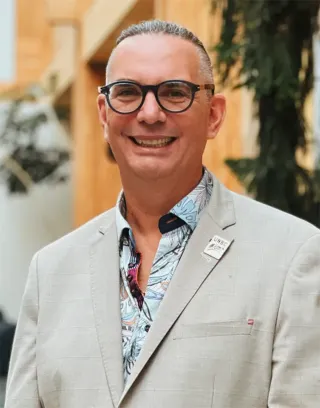
Owen, Dr. Bill
PhD, MA (University of Saskatchewan); BSc (Augustana University College)
Biography
Dr. Bill Owen is the Interim President and Vice-Chancellor of the University of Northern British Columbia.
Since joining UNBC in 2002 as a faculty member in the Department of Psychology, Dr. Owen has held a wide range of progressive academic leadership roles. These include Vice-Provost Faculty Relations, Interim Dean of the College of Arts, Social and Health Sciences, Vice-Provost Student Engagement, and most recently Interim Provost and Vice-President Academic. In each of these positions, he has worked closely with faculty, staff, students and community partners to advance the University’s mission while fostering a collaborative and dynamic academic environment.
As a professor, Dr. Owen has taught extensively, offering courses from foundational statistics to advanced seminars in cognition and psycholinguistics. His teaching excellence has been recognized with awards, and he continues to contribute through guest lectures. His scholarly background centers on visual word recognition, psycholinguistics and the Scholarship of Teaching and Learning.
Dr. Owen has a Bachelor of Science from Augustana University College and a Master of Arts and PhD from the University of Saskatchewan.
Dr. Owen’s leadership is rooted in UNBC’s founding vision as a university “in the North, for the North,” as well as in the UNBC Strategic Plan READY and the READY Roadmap: Academic Plan 2025–2031. With a strong focus on student success, faculty engagement and institutional excellence, he is deeply committed to ensuring that UNBC continues to serve as a beacon of academic innovation, inclusivity and community impact.
Research and expertise
Dr. Owen conducts research in basic reading and cognitive processes. He also engages in the scholarship of teaching and learning.
Selected publications
Borowsky, R., Owen, W.J., & Masson, M.E.J. (2002). Reevaluating the diagnostics for phonological lexical access: When the pseudohomophone naming advantage becomes a disadvantage. Memory & Cognition, 30, 969-987.
Borowsky, R., Owen, W.J., & Sarty, G.E. (2002). The role of the left hemisphere in motor control of touch: A functional magnetic resonance imaging analysis. Brain & Cognition, 49, 96-101.
Chambers, L., & Owen, W. J. (2024). The Efficacy of GenAI Tools in Postsecondary Education. Brock Education Journal, 33(3), 57–74. https://doi.org/10.26522/brocked.v33i3.1178
Owen, W.J. (2024). Growing into an academic leadership role. Times Higer Education Campus+ https://www.timeshighereducation.com/campus/growing-academic-leadership…
Owen, W.J., & Borowsky, R. (2003). Examining the modularity of lexical orthographic and phonological processing. Canadian Journal of Experimental Psychology, 57, 290-303.
Owen, W.J., Borowsky, R., & Sarty, G.E. (2004). FMRI of two measures of phonological processing in visual word recognition: Ecological validity matters. Brain and Language, 90, 40-46.
Owen, W. J., & Siakaluk, P. D. (2011). A demonstration of the Analysis of Variance using physical movement and space. Teaching of Psychology, 38, 151-154.
Owen, W.J. & Smith, H. (2009). Remembering our teaching heart in the midst of all the noise. Transformative Dialogues, 2(3), 1-4. http://www.kwantlen.ca/TD/past_issues.html
Siakaluk, P. D., Pexman, P. M., Aguilera, L., Owen, W. J., & Sears, C. R. (2008). Evidence for the activation of sensorimotor information during visual word recognition: The body-object interaction effect. Cognition, 106, 433-443.